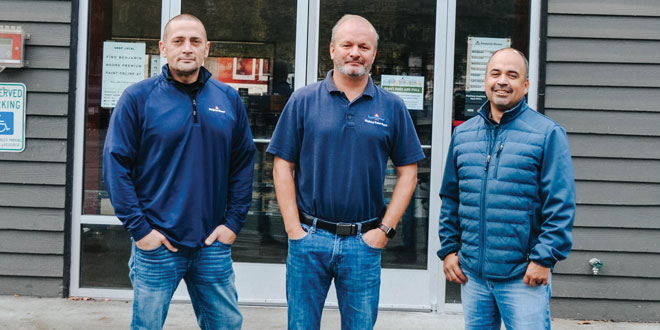No industry is immune to the lack of qualified workers right now. In a recent report from the Society for Human Resource Management (SHRM), 90 percent of employers who responded to the survey say they struggled to fill open positions over the summer, and 73 percent reported a decline in applications.
Independent home improvement retailers haven’t been left out of this struggle. In a recent retailer survey from the North American Hardware and Paint Association (NHPA), 61 percent of respondents say they had trouble finding qualified workers in the first half of 2021, a challenge they ranked second only to supply chain challenges. And 59 percent of retailers say they anticipate the challenges to continue this year.
However, despite anticipating their challenges of finding new staff to continue, retailers ranked investing in employees as the No. 1 focus for their businesses in 2022, at 61 percent of respondents to the NHPA survey.
A strong group of knowledgeable employees is crucial to business growth, and with more than half of survey respondents anticipating sales to stay flat or grow over 2021 this year, developing the team you have is key.
On the following pages, learn how Mallory Paint has created comprehensive strategies to build its bench of employees. The company has empowered its staff to be decision-makers at all levels so company leaders can work on the business and their teams can carry the business to greater heights.
Fit Finder
Juan Rios, general manager for Mallory Paint, says building your bench is about encouraging people to think for themselves, giving employees the power and acknowledging that mistakes are going to happen.
He manages 21 locations in the Seattle area, Spokane and Idaho. He started as a service associate 10 years ago. After just a year with the company, he was offered an opportunity to manage a new location in Kirkland, Washington.
“Our philosophy with management is to always promote from within. We don’t typically hire management from outside the company,” he says. “That opportunity is what catapulted my career.”
In addition to promoting from within, Mallory Paint owner Jim Mallory puts a lot of stock in his managers’ opinions. Mallory included Rios in location scouting and planning for the Kirkland location, so he was a key decision-maker long before the store he was going to manage was even developed.
“We always want the manager involved because we want them to have ownership,” Rios says. “From the shelving to the flooring to the paint on the walls, and everything in between, I was involved in those decisions for the Kirkland store, and it helped me make a connection.”
After four years managing the Kirkland store and another year serving as a regional manager, Mallory gave Rios another significant opportunity: general manager.
“Jim saw I had that eagerness to grow the business, so he developed a leadership role for me,” Rios says. “I’m a people person, and the success of our company has been based on relationships. Jim and I share that vision for the business.”
3 Tips for New Managers
So you don’t have to learn the hard way.
When Juan Rios started working at Mallory Paint, he didn’t have any industry experience. Over the last decade, he has had many learning opportunities that he passes on to his new managers so they can be more successful in their leadership roles.
- Never assume the color is right, that the job is done, that you have enough.
“I learned this one the hard way: I once assumed the color was right for a job, and I sent out 200 gallons, and it was wrong. Always double check your work.” - Get to know your employees and understand how they communicate.
“Everybody learns and accepts information differently. It’s important to know how to communicate with people so everyone is on the same page. That’s the only way you can gauge if they are progressing.” - Give people the opportunity to train on the job and learn by doing.
“When we’re training new hires, we usually have them shadow an assistant manager or an experienced employee to learn day-to-day operations. Typically we want people mixing paint within the first few days.”
Growth Path
Mallory Paint is on an upward trajectory; the company’s goal is to operate 36 locations by the year 2026. With that kind of aggressive growth on the horizon, Rios and Mallory agree that identifying leaders who are already in the organization and are familiar with company policies and procedures is paramount.
“We are always looking to identify ‘young lions,’” Rios says. “I let people know that they can be in management, in sales, they can go up to corporate. We’re a fast-growing company, and the best way to find leaders is to promote from within. I’m looking for honesty, good communicators, great listeners and people who are open-minded and flexible.”
Rios says you can get started by identifying those traits in the interview process. He says treating interviews like conversations will help find people who exhibit the personality traits you are looking for and who are eager to participate in the company’s future.
“Typically, with interviews, it’s about having a conversation, listening and observing the candidate’s communication style,” he says. “I also talk about the company’s history, its growth and the opportunities here. You can get a good sense of someone’s personality during that conversation.”
When a new hire is brought on board, training starts on Day 1. Typically, new employees will shadow the store manager or another experienced employee to learn operations. They also use online training. Rios says observing how they react to training is critical to knowing if they are a good fit.
“The paint industry isn’t for everyone, so we’re looking to make sure they can learn the language,” he says. “They’re getting exposure to both pros and DIYers when they do a little bit of everything.”
One thing Rios says they don’t let new hires do is answer the phone.
“We give them a few weeks before they start answering phones to make sure they know what they’re talking about,” he says.
Demonstrate Trust
When it comes to developing managers, Rios says the key is delegation, which for some people is easier said than done.
“It’s something you just have to do,” he says. “One thing I’ve learned is that when a manager tries to do everything, it’s a disservice to employees and to customers. I’ve seen a manager be promoted and leave a store, and none of the remaining employees know what to do. Managers should always be creating ‘mini me’s’ so the stores can operate in their absence.”
Rios is optimistic about the future of the Mallory Paint because he’s seen the growth of the organization over the last decade first hand. He says although the company has a unique position as a first-generation business in an industry with many family operations, he still sees Mallory Paint as a family business.
“Everybody has a part in the business. It’s all hands on deck,” he says. “The most important thing we tell our staff is that we’re a customer service business that happens to sell paint. We’ve been good about hitting our goals, and with Jim and upper management at the helm, we can definitely execute.”






